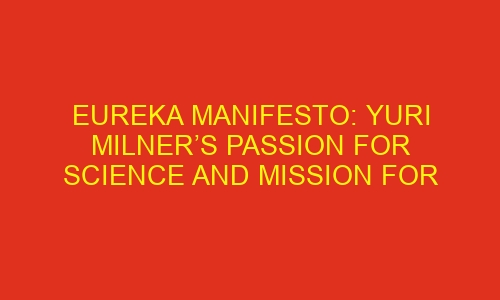During Yuri Milner’s earlier career, he made a fortune investing in internet giants like Facebook and Twitter. In 2012, he then signed the Giving Pledge, committing to donate at least half of his lifetime wealth to philanthropic, predominantly scientific causes. A former theoretical physicist, he believes fundamental science holds the key to discovering the mysteries of the Universe and uniting humanity.
In 2021, Milner published some of his ideas in a short book, Eureka Manifesto: The Mission for Our Civilisation. The book offers his view on humanity’s place in the Universe, the mission our species may be meant to fulfil, and the future we could be part of by embracing this mission.
Yuri Milner’s Passion for Science
Growing up, Milner dreamt of emulating his scientific heroes: great minds like Stephen Hawking, Galileo Galilei, and Marie Curie. Like them, he wanted to pursue life’s big questions and find profound truths.
After 10 years as a particle physicist, Milner decided his future lay in entrepreneurship. He became a technology investor, launching the internet investment firm DST Global. However, he also kept up with the latest scientific advances. Over time, he began to consider the ways he could support scientists’ endeavours.
In 2012, Milner and his wife Julia joined Mark Zuckerberg, Priscilla Chan, Sergey Brin, and Anne Wojcicki in founding the Breakthrough Prize, the world’s biggest science award.
In 2015, with the support of Hawking, Milner launched the Breakthrough Initiatives. These space science programmes investigate the deep questions of life in the Universe.
The Milners also created the Breakthrough Junior Challenge in 2015. This annual competition invites teenagers around the world to create short, illuminating videos about scientific ideas.
Milner’s philanthropic work extends beyond the scientific world. For example, he has founded Tech For Refugees, a non-profit that supports refugee relief efforts by offering funding to, and forming initiatives with, technology-led organisations.
However, science remains Milner’s greatest passion. His lifelong fascination with science, and his conviction that scientific knowledge can help humanity flourish, led him to write Eureka Manifesto.
Humanity’s Fundamental Mission
Eureka Manifesto makes the case that humanity has a fundamental mission: to explore and understand our Universe. Milner explains that the simple yet profound fact that humans are capable of exploring and understanding gives us our mission. He also believes that we need a shared mission. Without one, humanity is unlikely to thrive, or even survive, into the future.
There are five ways we can advance the mission. We can:
- Invest in fundamental science and space exploration. Projects like Milner’s Breakthrough Initiatives are paving the way for transformative discoveries and new technologies.
- Enable artificial intelligence (AI) to drive scientific progress. AI could power dramatic advances in our understanding of the Universe and improve our lives.
- Celebrate scientists as heroes. Milner’s Breakthrough Prize pioneers a cultural concept that raises the profile and prestige of scientists and mathematicians.
- Focus education on the Universal Story and use the power of art to tell it. The Universal Story, which encompasses the history of everything, could unify our current, hyper-specialised approach to teaching children.
- Spark a new enlightenment in which everyone can contribute to a shared culture of knowledge. We all have an important part to play in creating the social conditions that allow scientific thinking to prosper.
The Next Leap
Eureka Manifesto outlines the risks of neglecting our mission and the substantial rewards of accepting it. The risks include leaving humanity vulnerable to various extinction events, from anthropogenic climate change to collision with a large asteroid. The rewards include inconceivable technological progress and the chance of becoming a galactic civilisation.
Humanity hasn’t travelled further than the Moon. But new space programmes from government agencies and private investors could change all that within a couple of decades. NASA is developing technologies to send astronauts to Mars as soon as the 2030s. Robots could help us explore even further.
Meanwhile, technological advancement could transform our lives here on Earth and help us confront various challenges, from energy scarcity to incurable diseases. The future may hold leaps in progress that, for now, we can barely imagine.
Milner quotes the great theoretical physicist Richard Feynman: “We are at the very beginning of time for the human race.” It’s time for our civilisation to take the next step and embrace our cosmic mission.

